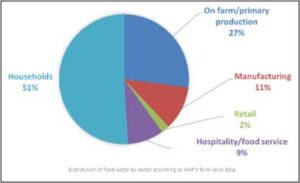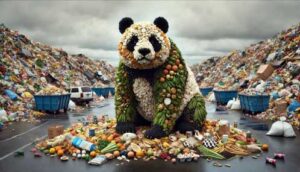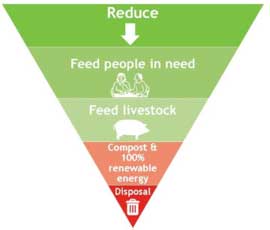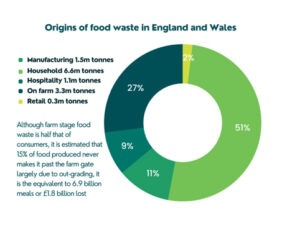Holly Whitelaw – founder of Gleaning Cornwall
One of the problems Gleaning Cornwall is helping to address, is food waste. Though the majority of food waste comes from our homes, a large proportion comes from primary production level, (on farms), with retail, hospitality and manufacturing making up the other 22% percent.

WWF figures include food waste used in animal feed.
15% of food produced never gets past the farm gates. There are many reasons for this and it is certainly not the fault of the growers. Producers have to plant extra, in order to ensure they have enough for their contracts and at the right time. Increasingly, unpredictable weather is making it harder for farmers to predict exact output. The crop, or part of it may also be the wrong size for the given market or the buyer may change their minds! Also, farm labour is expensive and we pay very little for our veg, when everything needed for its production is taken into consideration. Therefore, producers need to chose one or two optimum harvest times at which point not all the veg will be ready or the right size or standard required. Plants of course grow at different rates and pests and disease affect some produce too!
Potatoes are the most wasted food in the UK followed by bread, milk and meat! All this food takes time and energy to produce, including the harvesting and drying of seeds, the planting of plant plugs in heated greenhouses, the fertiliser and potentially other agrochemical production, transport and application, fuel for ground preparation, planting and harvesting, the processing, packaging, housing of farm labourers and transport costs! This energy all equates to Green House Gases.
If global food waste were a country, it would be the third largest polluter of Green House Gasses, after the US & China!
Each year around 3.3 million tonnes of food is either wasted or repurposed into animal feed from on farms across the UK. We estimate that Cornwall produces around 27,000 tonnes of food waste on its farms each year! Gleaning Cornwall manages to reduce this by around 80 – 90 tonnes a year, harvesting specific amounts, as requested by local food charities.
We also promote the wider issues of food waste as possible through talks, presentations, online and at events.

In the UK, on average, we each waste 110kg of food each year, that’s the weight of a Giant Panda!
Globally around 30% of food is wasted, amounting to Co2 emissions that are more than global air transport!
Tips to reduce our waste include;
- 1) Only buy what you know will be consumed.
- 2) Don’t be tempted with bargains or Buy 1 get 1 half price deals unless you can use it.
- 3) Use the freezer, if you have one, for surplus and offers.
- 4) Keep a check on your fridge & freezer & try not to lose food at the back!
- 5) Donate items to food charities, that you can’t use.
- 6) Use your Food Caddy to recycle plate scrapings and veg. peelings etc into energy via Anaerobic digestion. Note, just 12 banana skins can produce enough energy to fully recharge a laptop!
- 7) Maybe eat children’s leftovers for breakfast! It can be super nutritious. (-:

Other tips – https://www.bbcgoodfood.com/howto/guide/how-reduce-food-waste & https://www.lovefoodhatewaste.com/good-food-habits#Weekly-food-routine
Further reading – https://wwfint.awsassets.panda.org/downloads/wwf_uk__driven_to_waste___the_global_impact_of_food_loss_and_waste_on_farms.pdf & https://foodwastestories.com/2023/12/03/new-food-waste-report-and-final-update-for-2023/ & https://www.wwf.org.uk/press-release/hidden-waste-report-shines-light-uk-food-waste
If you have a business that deals with food – https://www.gov.uk/government/publications/food-and-drink-waste-hierarchy-deal-with-surplus-and-waste/food-and-drink-waste-hierarchy-deal-with-surplus-and-waste



Pingback: THE MOST WASTED FOOD IN THE UK | thestufflifeismadeofblog